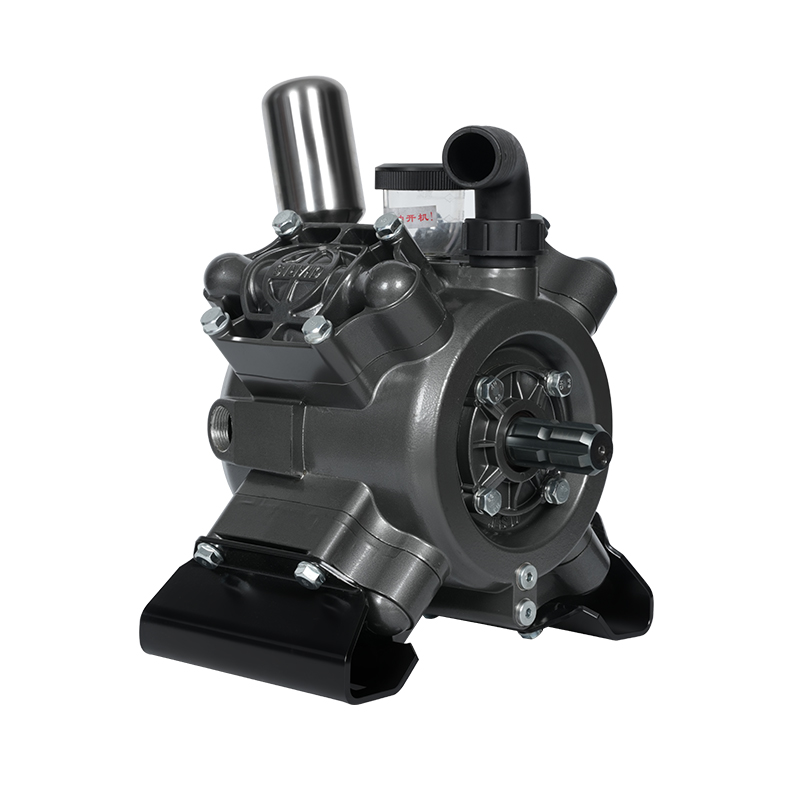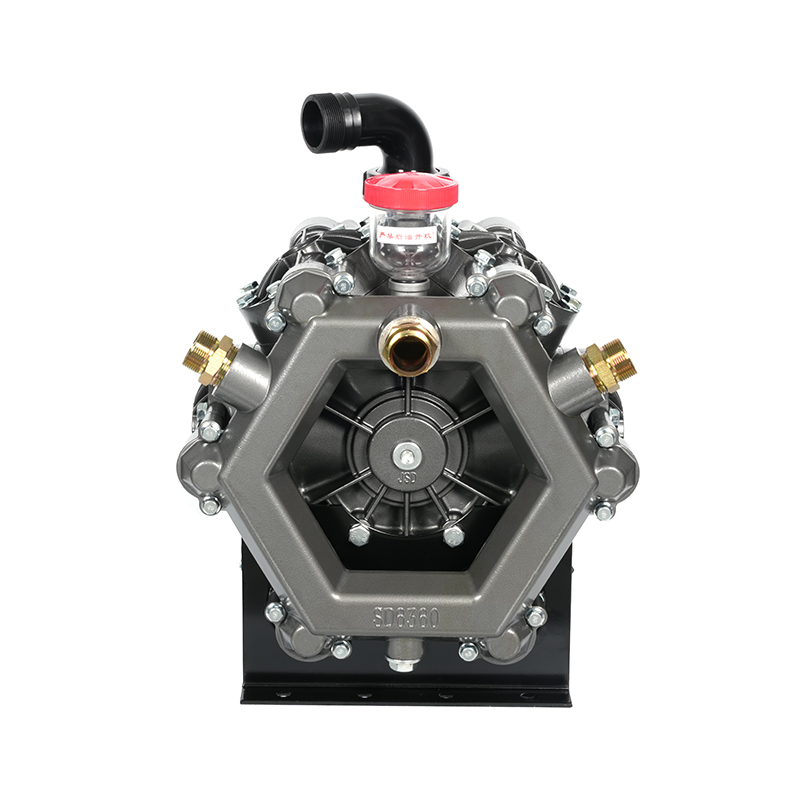Why Diaphragm Pumps Are a Must-Have for Irrigation: Tailored Advantages

Irrigation demands equipment that balances reliability, water efficiency, and adaptability to diverse terrains—all areas where diaphragm pumps excel. Their design addresses the pressing pain points for irrigation professionals:
Adaptability to Low-Quality Water Sources: Farms and forests often rely on ponds, wells, or rainwater tanks with sediment, debris, or mild contaminants. Diaphragm pumps’ non-clogging design (no tight clearances between rotating parts) handles water with suspended solids (e.g., sand, organic matter) without damage, eliminating the frequent blockages that plague centrifugal pumps.
Low Water Pressure Compatibility: Remote agricultural fields or hilly forest areas often lack consistent high water pressure. Diaphragm pumps’ self-priming ability (up to 8 meters of suction lift) allows them to draw water from shallow wells or low-lying tanks, even when installed above the water source—no need for costly pressure boosters.
Water-Saving Precision: Modern diaphragm pumps integrate with drip irrigation and sprinkler systems seamlessly. Their steady, pulse-free flow rate (adjustable via variable-speed controls) ensures uniform water distribution—reducing water waste by up to 40% compared to over-irrigation with less precise pumps. For cash crops like vineyards or vegetables, this precision also boosts yield by preventing root rot or drought stress.
Durability in Outdoor Conditions: irrigation equipment faces temperatures (from scorching summer heat to freezing winters), dust, and humidity. Diaphragm pumps with corrosion-resistant housings (aluminum alloy or stainless steel) and weather-sealed motors withstand these elements, cutting maintenance costs by 25% annually compared to plastic-bodied pumps.

How to Ensure the Long-Term Performance of Your Micro Diaphragm Air Pump?
Micro diaphragm air pumps are valued for their compact size, oil-free operation, and reliability in applications ranging from medical devices to aquariums and small-scale aeriation. Their longevity and consistent performance are directly linked to a structured approach to maintenance and operation. Unlike larger industrial pumps, their small size means that seemingly minor issues like a small amount of dust or intermittent use can have a significant impact. A proactive maintenance regimen, focusing on the core principles of cleanliness, component care, and operational awareness, is the effective way to ensure these pumps operate as intended over their full service life.
Establishing a Foundational Maintenance Routine
The foundation of micro pump maintenance is preventative. The critical step is ensuring the pump's air path remains clean and unobstructed. This involves regularly inspecting and, if necessary, cleaning or replacing the inlet air filter. A clogged filter forces the pump to work harder to draw air, increased strain on the diaphragm and motor, reduced airflow, and potential overheating. In environments with significant dust or lint, this inspection should be frequent. The pump should also be operated within its specified voltage range; under-powering can prevent it from starting correctly, while over-voltage can cause the motor to overheat and fail prematurely. Furthermore, these pumps are designed for continuous duty; allowing them to cool down after extended periods of use, rather than cycling them on and off frequently, can help extend the life of the electrical components.
Focusing on Key Wear Components
The diaphragm is the heart of the pump, a flexible membrane that moves back and forth to create airflow. Over time, this material can fatigue, harden, or tear. A failing diaphragm often manifests as a noticeable drop in flow rate or pressure, increased operating noise, or a complete loss of function. While the replacement interval varies based on operating hours and cycle frequency, having a replacement diaphragm on hand for common pump models is a practical precaution. The valves, which are typically small flapper or reed valves, ensure one-way airflow. If these valves become contaminated with debris or lose their seal, the pump's efficiency will drop, as air slips backward with each stroke. Cleaning the valve seats or replacing the valve assembly itself can often restore performance. For pumps with plastic housings, it is also important to periodically check that all screws and fasteners are snug, as vibration over time can cause them to loosen, potentially creating air leaks.
Operational Monitoring and Troubleshooting
Regular monitoring provides early warnings of potential problems. Unusual noises, such as clicking, grinding, or a change in the typical hum, often indicate an internal issue. A clicking sound may point to a foreign object interfering with the diaphragm or valve movement, while a grinding noise could suggest bearing wear in the motor. Consistent performance logging, such as noting the pump's flow rate or pressure against a known load, can establish a baseline. A gradual deviation from this baseline can signal wear before a complete failure occurs. When troubleshooting a problem, a systematic approach is better: verify the power supply and check for obstructions in the inlet filter and outlet tubing. If these are clear, the investigation typically moves to the internal components, specifically the diaphragm and valves, as the likely sources of performance degradation.
What Precautions Should Be Taken When Using an Electric Driven Diaphragm Pump?

Electric driven diaphragm pumps, which range from small units to large industrial models, are versatile and known for handling tough tasks like dewatering, transferring aggressive chemicals, or pumping slurries. Their safe and effective operation is contingent upon adhering to a set of precautions that address electrical safety, material compatibility, and operational limits. A failure to observe these guidelines can equipment damage, personal injury, or a failure of the process they support. Therefore, a comprehensive understanding of these precautions is not merely a recommendation but a fundamental requirement for anyone installing, operating, or maintaining this equipment.
- Addressing Electrical and Installation Safety
The primary precaution with any electric-driven equipment is managing the risk of electrical shock and fire. The pump must be connected to a power source that matches its voltage and phase requirements and is protected by a correctly rated circuit breaker or fuse. For pumps used outdoors or in damp environments, a Ground-Fault Circuit Interrupter (GFCI) is a critical safety device. The pump's grounding terminal must be properly connected to a verified earth ground. Furthermore, in areas where flammable vapors or combustible dust may be present, it is imperative to use a pump motor with an appropriate explosion-proof rating to prevent the motor from acting as an ignition source. Physical installation is also key; the pump should be positioned on a stable, level surface to minimize vibration and strain on the connections. Ensuring that the electrical cable is routed away from sharp edges, standing water, and high-traffic areas prevents damage that could a short circuit.
- Ensuring Material Compatibility and Dry-Run Protection
A significant advantage of diaphragm pumps is their ability to handle a wide range of fluids, but this is entirely dependent on the construction materials being compatible with the fluid being pumped. Using a pump with an EPDM diaphragm and PVC housing to pump a solvent that attacks those materials will rapid pump failure and potential leakage of hazardous material. Always consult the manufacturer's chemical resistance guide to confirm that the wetted materials—including the diaphragm, valve balls, seats, and housing—are suitable for the specific fluid. Another critical operational precaution is to avoid prolonged dry running. While diaphragm pumps can tolerate brief periods without fluid, extended dry running causes excessive heat buildup from the lack of cooling and lubrication provided by the fluid. This can quickly degrade the diaphragm, damage valves, and in severe cases, seize the pump. Using a run-dry protection device or ensuring the pump is only started when liquid is present are effective mitigation strategies.
- Managing Operational Limits and System Configuration
Every pump has defined operational limits for flow, pressure, and temperature. Operating a pump beyond its pressure rating places stress on the diaphragm, connecting rods, and housing, which can a catastrophic failure. Similarly, pumping fluid at a temperature higher than the pump's rating can soften or deform plastic components and accelerate the aging of elastomer diaphragms and seals. The inlet and discharge plumbing also require attention. The suction line should be as short and straight as possible and of a diameter at least as large as the pump's inlet port to prevent cavitation, a condition that causes noisy operation, vibration, and erosion of pump components. On the discharge side, never close the outlet valve completely while the pump is running, as this traps fluid and rapidly increases pressure until a component fails. Instead, use a bypass line or a variable speed control to regulate flow. Finally, for pumps used in critical applications, installing pressure relief valves on both the suction and discharge sides can protect the pump and the broader system from pressure surges.

 EN
EN  English
English 中文简体
中文简体 русский
русский